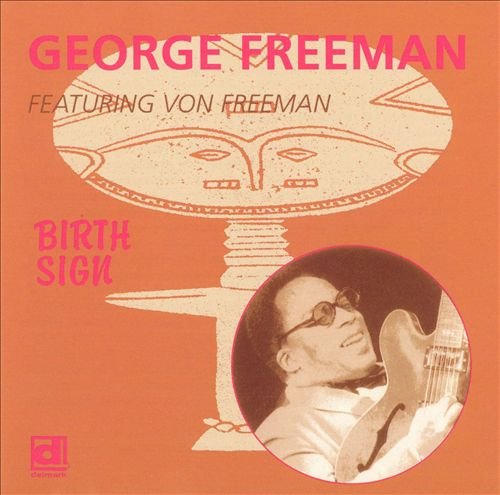
George Freeman - Birth Sign (1993) FLAC
BAND/ARTIST: George Freeman
- Title: Birth Sign
- Year Of Release: March 11, 1969 & March 12, 1969
- Label: Reissue
- Genre: Jazz, Soul Jazz, Hard Bop, Guitar Jazz
- Quality: Flac lossless
- Total Time: 40:38
- Total Size: 225 MB
- WebSite: Album Preview
Tracks
1 Mama, Papa, Brother
2 Cough It Up
3 My Scenery
4 Must Be, Must Be
5 Birth Sign
6 Hoss
7 My Ship
Personnel
Arranged By – George Freeman, Michael Cuscuna
Drums – Billy Mitchell (3)
Guitar – George Freeman
Organ – Robert Pierce (tracks: 4), Sonny Burke
Tenor Saxophone – Kalaparusha-(Maurice McIntyre) (tracks: 4), Von Freeman (tracks: 2, 3, 6, 7)
Trombone – Lester Lashley
Chicago electric guitarist George Freeman was a quintessential sideman when backing bands led by Lester Young, Charlie Parker, Richard "Groove" Holmes, Gene Ammons, and Shirley Scott. This is his debut recording, done in the height of the soul-jazz era circa 1969, featuring his famed brother Von Freeman on tenor sax for four tracks, drummer Billy Mitchell throughout, and either Sonny Burke or Robert Pierce on the Hammond B-3 organ. At times Freeman's sound traces to no single individual source, though it is steeped in Chi-Town blues and a progressive stance that is apart from the Wes Montgomery/George Benson school of the day. Freeman's individualism is heard to best effect as he rocks out with a bit of distortion and loose associations on the boogaloo "Mama, Papa, Brother," while during the title track you hear pinched, lemon-sour notes under a tribal village groove that approaches Native American beats. Burke, a truly unsung hero of the organ, burns for long stretches during the ultra-slow standard "My Ship" and slides through the changes of "Hoss," which is clearly based on the changes of "Sweet Georgia Brown." Von Freeman is completely in tune with his brother when they play in perfect tandem on the soulful "Cough It Up," fluttering à la Charlie Parker, while ramping down on the ballad "My Scenery," where the saxophonist plays a remarkable, in-tune, enjoyable solo. The cut separate from the rest, "Must Be, Must Be," includes AACM members Lester Lashley and Kalaparusha Maurice McIntyre on trombone and tenor sax, respectively. It's an easy blues elevated by the horns and Pierce's fleet multiple note lines rivaling Jimmy Smith, representing the ultimate modern confluence in what was happening at that time in Chicago. Too bad the world never really heard enough of George Freeman, and although this is a small taste, it is a more than adequate amuse-bouche.
Michael G. Nastos
1 Mama, Papa, Brother
2 Cough It Up
3 My Scenery
4 Must Be, Must Be
5 Birth Sign
6 Hoss
7 My Ship
Personnel
Arranged By – George Freeman, Michael Cuscuna
Drums – Billy Mitchell (3)
Guitar – George Freeman
Organ – Robert Pierce (tracks: 4), Sonny Burke
Tenor Saxophone – Kalaparusha-(Maurice McIntyre) (tracks: 4), Von Freeman (tracks: 2, 3, 6, 7)
Trombone – Lester Lashley
Chicago electric guitarist George Freeman was a quintessential sideman when backing bands led by Lester Young, Charlie Parker, Richard "Groove" Holmes, Gene Ammons, and Shirley Scott. This is his debut recording, done in the height of the soul-jazz era circa 1969, featuring his famed brother Von Freeman on tenor sax for four tracks, drummer Billy Mitchell throughout, and either Sonny Burke or Robert Pierce on the Hammond B-3 organ. At times Freeman's sound traces to no single individual source, though it is steeped in Chi-Town blues and a progressive stance that is apart from the Wes Montgomery/George Benson school of the day. Freeman's individualism is heard to best effect as he rocks out with a bit of distortion and loose associations on the boogaloo "Mama, Papa, Brother," while during the title track you hear pinched, lemon-sour notes under a tribal village groove that approaches Native American beats. Burke, a truly unsung hero of the organ, burns for long stretches during the ultra-slow standard "My Ship" and slides through the changes of "Hoss," which is clearly based on the changes of "Sweet Georgia Brown." Von Freeman is completely in tune with his brother when they play in perfect tandem on the soulful "Cough It Up," fluttering à la Charlie Parker, while ramping down on the ballad "My Scenery," where the saxophonist plays a remarkable, in-tune, enjoyable solo. The cut separate from the rest, "Must Be, Must Be," includes AACM members Lester Lashley and Kalaparusha Maurice McIntyre on trombone and tenor sax, respectively. It's an easy blues elevated by the horns and Pierce's fleet multiple note lines rivaling Jimmy Smith, representing the ultimate modern confluence in what was happening at that time in Chicago. Too bad the world never really heard enough of George Freeman, and although this is a small taste, it is a more than adequate amuse-bouche.
Michael G. Nastos
Download: IsraCloud
Jazz | Soul | FLAC / APE
As a ISRA.CLOUD's PREMIUM member you will have the following benefits:
- Unlimited high speed downloads
- Download directly without waiting time
- Unlimited parallel downloads
- Support for download accelerators
- No advertising
- Resume broken downloads


